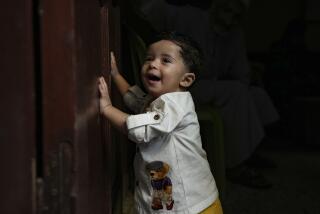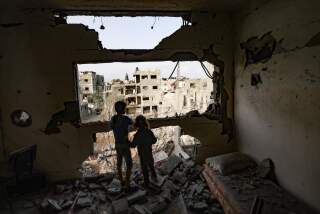A Shrapnel Victim Shows His Mettle
- Share via
Mostafa is a wide-eyed 8-year-old Iraqi boy riddled with sharp, twisted metal that has sliced so close to his spine that doctors fear he will be paralyzed if it moves farther.
He is not a casualty of the current war. His neighborhood near Basra, close to the no-fly zone in southern Iraq, was hit by a shell four years ago, and he has suffered from his wounds since then, his mother said. But Mostafa got lucky Wednesday. As war roiled his homeland, the boy and his mother arrived in Los Angeles on special visas so he can get medical treatment.
“God will help us,” said Mostafa’s mother, Akbal Fithyab, 46, who got off a plane at Los Angeles International Airport with her son in the wee hours.
According to his mother and the humanitarian groups who made his journey possible, Mostafa’s community of Al Jumhuriya on the outskirts of Basra was hit Jan. 25, 1999, by what Pentagon officials said may have been an errant U.S. missile. His brother, Haider, was killed in the attack, and Fithyab now honors his memory by asking people to call her Um Haider -- “the mother of Haider.”
“God will help us get treatment to make Mostafa a normal boy, because he suffers from so many things,” she said in a telephone interview.
The office of Rep. Dennis J. Kucinich (D-Ohio) helped the pair get the visa in Amman after they traveled overland to Jordan, arriving March 9. “This is a very moving case emotionally,” said Kucinich spokesman Doug Gordon.
“The congressman saw a child in desperate need of medical attention that can be provided in the United States.”
In Los Angeles, a doctor said he is arranging for the surgery Mostafa will need to remove 30 pieces of shrapnel embedded in his body, and fit the boy with a prosthesis to regain full use of one hand where two fingers had to be amputated.
Mostafa may also need trauma counseling, said the doctor, who asked not to be identified, saying he wants to keep a low profile.
“He may need to get treatment at more than one hospital,” the doctor said, “but we will get him the very best care.”
Fithyab said she was in the kitchen with two of her children the day her neighborhood was rocked by a powerful explosion that smashed her dishes. She rushed outside, where her sons had been playing, and found Haider dead. She carried the wailing Mostafa down the highway to a hospital, she said.
“I was so frightened I would hurt him,” she recalled in a videotaped account of the episode.
The following July, she said, a delegation of the Chicago-based Voices in the Wilderness, a group that has long opposed sanctions against Iraq, visited the hospital where Mostafa was being X-rayed to monitor the migration of the shrapnel through his body. One of the visitors asked if anyone there spoke English and could translate.
Fithyab, a primary-school teacher, told him, “I can speak English.” And she told him the family’s story.
The delegate, whom she identified as Chris Doucot, accompanied mother and son out of Iraq to Jordan, she said.
By then, Kucinich’s office had been alerted to the case by Cole Miller, a Los Angeles writer and Web content designer who learned about Mostafa through a photojournalist.
Kucinich called the U.S. Consulate in Amman, the Jordanian capital, on March 18, his office said.
“The congressman expressed his strong support for bringing the child to the United States and getting him the proper medical care,” Kucinich spokesman Gordon said. Still in Basra is Mostafa’s father, a retired clerk in the Ministry of Health, with the couple’s two teenagers and some of their extended families. They also have relatives in Baghdad. The war has cut off phone communications, and Wednesday afternoon Fithyab headed to a mosque to pray for them.
“I am so worried about my family,” she said. “I need to sleep so badly, but I can’t sleep.”
And Mostafa? On Wednesday afternoon he was at a playground, kicking a soccer ball around, trying his hand at basketball -- and at English. “I wasn’t scared of the bombing!” he said with bravado. “I am Mostafa! I am 8 years old! I wish I had a bicycle!”
More to Read
Sign up for Essential California
The most important California stories and recommendations in your inbox every morning.
You may occasionally receive promotional content from the Los Angeles Times.










